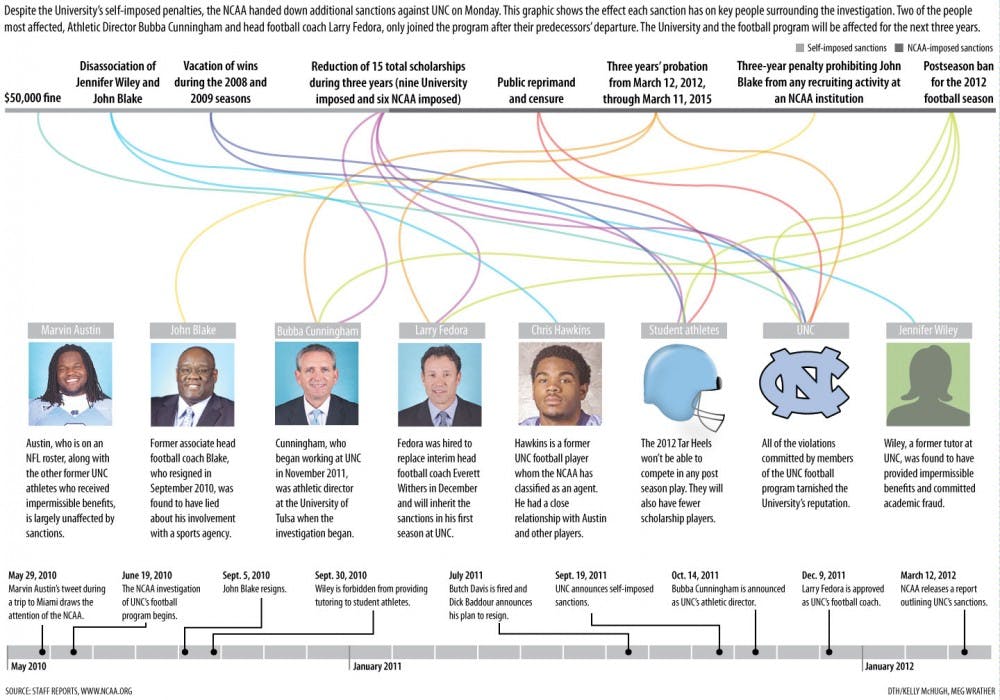Although former head football coach Butch Davis was fired in connection with the investigation, he was never specifically accused of any wrongdoing in the NCAA’s notice of allegations or the report that was released Monday.
Blake, who resigned from his coaching role at UNC in September 2010, denied any activity with a sports agency when he was interviewed by the NCAA, according to the report.
But upon further investigation by the NCAA, it was determined that Blake not only had a credit card from the agency in his name, but he was also listed as an agency vice president in a brochure.
According to NCAA.org, the average time between an infractions committee hearing and the release of an infractions report is eight to 12 weeks. However, partially because Blake was slow to cooperate with the NCAA’s investigation process, the report took more than 19 weeks to surface.
What the future holds
In its response letter to the NCAA’s allegations sent Sept. 19, UNC instituted a new social media policy alongside a series of self-imposed sanctions.
The football team vacated all wins from the 2008 and 2009 seasons and decreased the number of scholarships by nine over a three-year period. The University also issued itself a fine of $50,000 and two years’ probation.
But according to the NCAA, it wasn’t quite enough.
The one-year postseason ban handed down Monday means UNC will be ineligible to compete in a bowl or an ACC championship game if the Tar Heels win the Coastal Division in 2012.
Because of this sanction, seniors on the football team have the opportunity to transfer without penalty.
The NCAA compounded the University’s self-imposed probation by adding one more year to the term, and it also increased the number of scholarships reduced from nine to a total of 15 during a three-year period.
In its notice of allegations, the NCAA charged UNC with not properly monitoring the social media of its student athletes, and the University contested that allegation at its Oct. 28 hearing.
To get the day's news and headlines in your inbox each morning, sign up for our email newsletters.
But in a teleconference with members of the NCAA Committee on Infractions, chairman Britton Banowsky said such monitoring is relatively out of the University’s control.
“The committee wants to be clear that, while there will be times where social media is an important tool for discovering violations, the committee is not imposing a blanket duty on member schools to monitor social networking sites,” Banowsky said.
New head football coach Larry Fedora has not issued a social media policy with his team, and UNC Athletic Director Bubba Cunningham said in January that Fedora plans to give his team freedom in that regard.
“We are required to pay attention to (social media), but it’s not even resolved within the NCAA yet,” Cunningham said. “So that’s going to be a dynamic policy that’s going to change with the times.”
Moving on
Though it does have the option to appeal the sanctions, Thorp said the University has decided to accept its fate and begin moving on now instead of allowing the investigation process to drag on further.
“The ruling is disappointing for our new coaching staff and for our student athletes,” Thorp said in a statement released Monday. “We considered an appeal, but appeals rarely succeed, and penalties are suspended during an appeal. We made mistakes, and we take responsibility for that.”
Because the University educated its tutors and coaches about the dangers associated with impermissible benefits and academic fraud, the NCAA did not find a lack of institutional control.
The NCAA also said the University’s cooperation throughout the investigation was taken into account.
Baddour said he’s pleased with the way UNC has been represented throughout the process. Mistakes were made, but the essence of the University has remained, he said.
“There’s still a Carolina Way, and the way we did this investigation, it was my strong belief that it was the Carolina Way,” Baddour said. “We set out four guiding principles when we started, and number four was we would be better as a result of this.
“And under the leadership that we have, I’m confident that will happen.”
Contact the Sports Editor at sports@dailytarheel.com.



